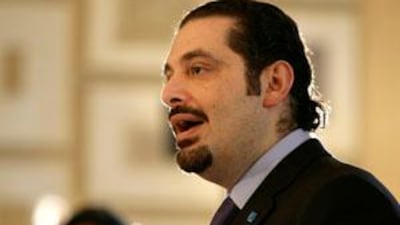BEIRUT // Lebanon's Hizbollah-led opposition movement yesterday accepted a proposal by the incoming prime minister, Saad Hariri, that establishes a unity government built around a compromise cabinet that will give 15 seats to the majority, ten to the opposition and five to be controlled by the neutral president.
"We hope that this step will be beneficial for Lebanon and its people," Hizbollah said in a statement cited by Agence France-Presse late on Friday night. The move came following a meeting between Hizbollah's leadership and other opposition figures held to discuss joining a unity government. "Those who took part in the meeting agreed to join a national unity government based on the agreements reached during negotiations."
Lebanon was awaiting a formal response yesterday from Mr Hariri, who now needs to inform the president Michel Suleiman about whether he accepts the final terms of the compromise, with initial indications that he would move to formally announce a cabinet after he received a notice of official acceptance from the opposition. That official notification was delivered to Mr Hariri mid-afternoon yesterday.
"The government is as good as formed," MP Okab Sakr, who is close to Mr Hariri, told TV Jeddid, an opposition-friendly news station in Beirut. "It's all about the final touches now and its formation will be completed this weekend." The so called "March 14" movement of Sunni, Druze and some Christian groups has battled the opposition, composed mostly of Shiite and dissident Christian parties, for five months over how to allocate the ratio of seats among important ministries.
Although the 15-10-5 compromise, which Hizbollah had insisted upon in order to prevent any government mandate to disarm, had been approved almost immediately, the ensuing months saw an occasionally personal and often bizarre dispute between Mr Hariri and the key Christian opposition leader, Michel Aoun. The fight revolved around the number and type of ministries that would be controlled by Mr Aoun's Free Patriotic Movement party (FPM).
Mr Aoun had demanded that his son-in-law, Gibran Bassil, be allowed to continue as minister of telecommunications, a demand Mr Hariri rejected, arguing that the lucrative telecommunications ministry, which could lead a major deregulation effort later this term, return to the majority. But after months of neither side refusing to budge on an issue widely seen as minor, and claims by all parties that the problems were domestic and not linked to external actors, as is often the case in Lebanese political feuds, both sides were eventually shamed into co-operation by their international allies who had tired of the fight.
Mr Hariri's movement draws significant political and financial support from Saudi Arabia, while the opposition parties have long been aligned with Syria. Both nations recently ended a feud that had developed in 2005 after Syria was widely blamed for orchestrating the murder of Mr Hariri's father, a close friend of the Saudi royal family. According to political sources within both sides of the divide, none of whom would speak on the record for fear of ruining the breakthrough, in recent days both Saudi Arabia and Syria agreed to pressure their allies to compromise, with the Saudis arguing to Mr Hariri that he should yield the telecom ministry, while Syria and Hizbollah both applied significant pressure on Mr Aoun to stop raising new objections every time Mr Hariri attempted to broker a deal.
Last week, after Mr Hariri agreed to let Mr Aoun's party keep the telecom ministry, the FPM responded with a list of new demands, a move that frustrated not only the majority but Mr Aoun's allies in Hizbollah and the Amal Movement. Parliament speaker Nabi Berrih, in theory an ally of Mr Aoun's, could barely disguise his anger in a public appearance earlier in the week over the shift and was clearly pressuring his Christian comrades to end the impasse.
"The deal was brokered by Berrih and Hizbollah," said an opposition figure not linked to Mr Aoun. "By releasing the statement [that] there was a deal, Hizbollah put its credibility into ending the stalemate. Now Aoun can't make them look bad and add more demands." Mr Aoun's final tally of spoils from the fight, which left Lebanon leaderless and its ministries completely frozen for nearly half a year, included the telecommunications, energy, tourism and industry ministries, with a fifth minister receiving the powerless conciliation prize of "state minister", whose portfolio includes the chair that the minister will sit in during cabinet meetings.
Mr Berrih's Amal party will control the foreign affairs and health ministries, as well as the youth and sports ministry. Hizbollah will control agriculture ministry and the ambiguously titled "administrative reform" ministry. The interior minister, Ziad Baroud, will remain in his post, as will the defence minister, Michel Murr. mprothero@thenational.ae

